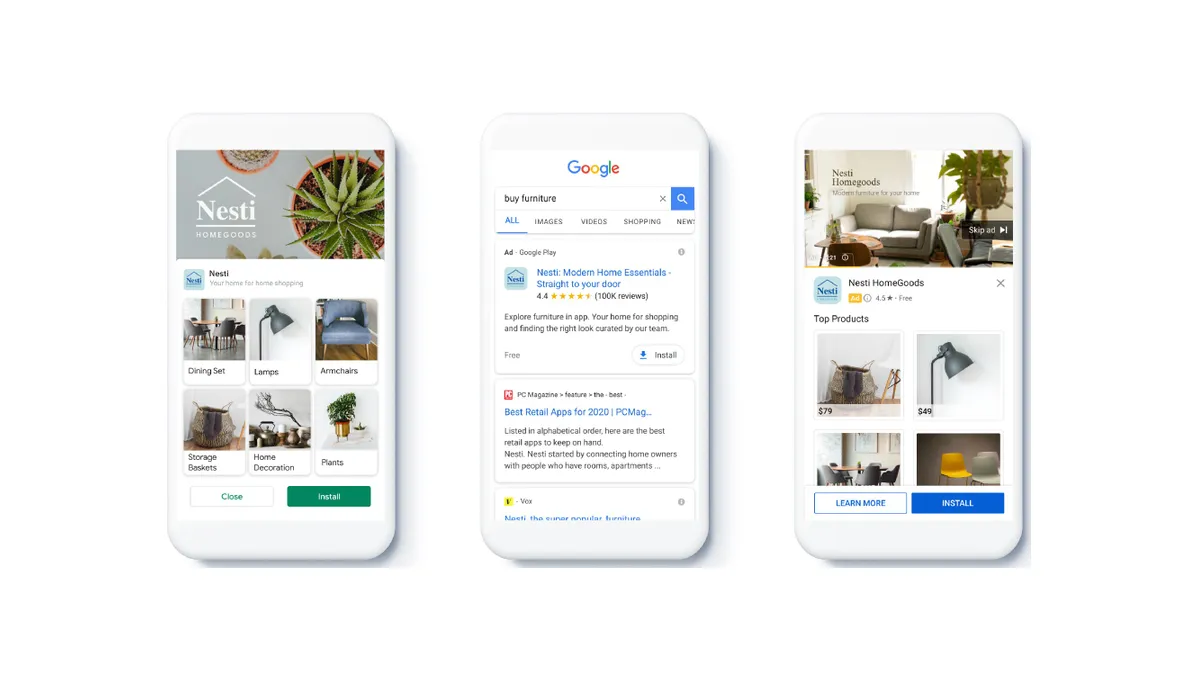Brief:
- Google released several tools to help mobile marketers improve the customer experience (CX) among apps and the mobile web. The company updated its Test My Site tool to help measure website speeds and provide customized tips on how to improve a mobile website by adding services such as one-step checkout and push notifications, per information shared with Mobile Marketer.
- E-commerce company Wish experienced a 105% jump in purchases from its app at a similar cost per acquisition (CPA) in a test of Google's "feeds in app campaigns," which will be rolled out globally this year. Using feeds and "deferred deep linking," Wish can guide a mobile user who sees an ad for a product to the product page in its app, even if that user has to visit an app store to download the app first. Deep linking is already available for search, display and shopping ads, and will be added to YouTube, Hotel, Gmail and Discovery ads this year. Google also is offering a new "ad destination report" to help marketers see how consumers are visiting a site after seeing an ad.
- In other company news, Google changed its privacy settings to automatically delete data about an internet user's location data and web and app activity after 18 months for new users. Previously, automatic deletion was turned off by default, and Google users had the option to delete data after three months or 18 months. YouTube data will be deleted after 36 months by default, though that setting also can be changed. Among other data privacy changes, Google also added a feature to make it easier to toggle its incognito mode in Search, Maps and YouTube mobile apps, Sundar Pichai, CEO of Google and Alphabet, said in a separate blog post.
Insight:
Google's new offerings could help mobile marketers optimize their web and app-based services in several ways. The Test My Site tool provides more information about website performance, with Google saying that improving the load time of a site by just 0.1 second can improve conversion rates by up to 8%. Test My Site has sections for mobile marketers and developers, providing more customized advice for each group.
The feeds in app campaigns and deferred deep linking are notable for helping to maintain the continuity between serving an ad to a potential mobile customer and showing a product page inside an app. Currently, customers that see a product in an ad have to search for the product again after downloading a retailer's app from an app store. Google aims to make the experience more seamless for customers by removing some of those steps. As a result, retailers can show a product in an ad and lead potential customers directly to a product page that appears after they download the app. Advertisers using feeds experience an average of 6% more installs from Google.com and 17% more in-app actions, while deep-linked ads typically have a conversion rate that's twice as much as ads without deep linking, per Google.
Google's separate changes to privacy settings might not have a meaningful impact on mobile marketers that seek to reach customers on its various platforms, including search, Google Maps and YouTube. User data that are more than 18 months old are much less likely to indicate purchase intent than more current information about a person's online activities, especially amid disruptions like the coronavirus pandemic. Marketers buy search ads and keywords to reach customers who indicate their intentions with their online searches, or YouTube ads to reach target audiences based on topics, keywords or demographics, for example.
For Google, the additional services and changes to its privacy practices are unlikely to have a significant effect on its revenue this year amid a slump in media spending during the coronavirus pandemic. The company's ad revenue is forecast to drop for the first time since tracking began, falling 5.3% to $39.6 billion by the end of this year, researcher eMarketer forecast this week. Google faces growing competition for ad dollars from Facebook and Amazon, which are expected to increase their share of the digital advertising market.
Meanwhile, privacy issues continue to dog Google, as seen with a French court's decision last week to uphold a $56 million fine on the company for breaching the European Union's privacy rules, and a proposed class action in the U.S. for allegedly tracking people's internet use on web browsers set in "private" mode, Reuters reported in separate stories.












